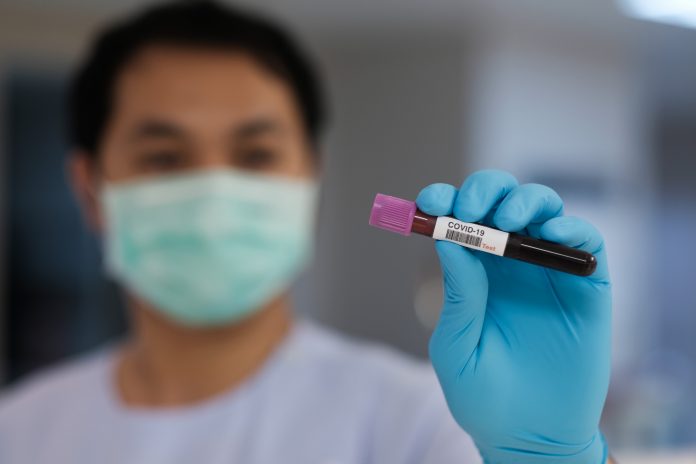René Seifert, co-founder of TrueProfile.io, discusses the role that blockchain can play in the fight against COVID-19
Right before our very eyes, we are seeing how COVID-19 is stress-testing some of the very best healthcare systems across the globe. It still isn’t clear what the future holds and if or when things will return back to ‘normal’, but it has been inspiring to watch how both businesses and individuals have been unrelenting in their commitment to supporting the health and social care sectors tackle the pandemic.
However, with so much pressure being placed on our own NHS, this begs the question as to whether there are any pioneering technologies readily available to support the UK’s health and social care sectors in the fight against COVID-19.
One technology that has gone largely under the radar is blockchain, and we at TrueProfile.io believe that it simply has to be at the forefront of any innovation in the ongoing fight against COVID-19, particularly when it comes to ensuring the sector can quickly and securely gain access to the skills it needs.
What is blockchain?
A blockchain is a shared, distributed file which records transactions. Each transaction is added as a block and is stored decentralised in the chain. Crucially, this means that no central party has control over its content, and nobody can tamper with the records because every member has to agree to its validity and can check the history of record changes.
Early reports about blockchain were dominated by references to cryptocurrency, which made it seem like the only application for the technology would be across the financial services market. However, a range of sectors have begun to utilise the technology for a variety of use-cases, including health and social care. In particular, blockchain in healthcare is usually mentioned in the context of patients’ medical records, as it can provide absolute proof and confidence that they cannot be altered.
However, in light of the COVID-19 pandemic, it is crucial that other use-cases for blockchain are considered across the sector, as the scope for innovation with this technology is limited only by our imagination.
The issue of staff shortages
More than ever, healthcare professionals are needed around the world to support and bolster the worldwide efforts to combat and curtail the impact of COVID-19. However, as the pandemic continues to get more severe, workforce shortages are likely to become more acute, meaning that the NHS and many other formerly-functioning healthcare systems will very quickly become overwhelmed and understaffed.
However, even before the pandemic started, the NHS was already under enormous pressure to fill much-needed roles across the country and was suffering from growing staff shortages. In fact, recent reports suggest that staff shortages in the NHS are expected to grow to almost 250,000 by 2030 from 100,000 in 2018[1].
The question is, can innovative technologies, such as blockchain, provide the NHS with both immediate and long-term relief by ensuring it has the staff required to tackle the COVID-19 crisis head-on?
Plugging the skills gap through blockchain
The answer is yes, as utilising blockchain has the capacity to help the NHS streamline its recruitment process and connect with healthcare professionals from across the world faster and more securely.
For context, the current NHS recruitment process can take anywhere up to six months, particularly when it comes to hiring medical professionals from abroad and verifying their credentials. However, this is a timeframe that hospitals just simply don’t have right now.
This is where blockchain can make an enormous difference. For example, using a blockchain-enabled professional document verification platform will enable candidates to securely upload and verify private documents, such as passport or university certificates, providing them with a form of portable credentials. NHS recruiters and healthcare regulators will then be able to view and verify candidates’ credentials against the blockchain.
As a result, where it might have taken the NHS anything up to six months to verify an overseas candidate’s credentials, the latest blockchain-enabled online platforms remove these obstacles in one fell swoop. This offers the NHS a way to significantly reduce the time-to-hire of medical professionals by up to 20-30 days through giving NHS recruiters access to a bank of pre-screened and authenticated medical professionals who are ready to down tools and move where they are needed most. In the ongoing fight against COVID-19, this increased efficiency, without compromise on security, could prove to be the difference.
Thinking more long-term: Can blockchain play a role in NHSX?
Although COVID-19 is rightly dominating the agenda at present, it is also important to discuss the potential of blockchain to transform the NHS post-Brexit and how it should feature in the government’s flagship digital transformation programme: NHSX.
With Brexit now underway, the NHS is expected to close the growing skills gap across the health and social care sector by opening the door to an influx of healthcare professionals from across the globe. By using blockchain technology, such as a blockchain-enabled professional document verification platform, the NHS will be able to eliminate the continual churn of verification requests every time a healthcare professional applies for a new role. This ensures that the NHS will be able to swiftly take advantage of the expected inflow of healthcare professionals post-Brexit and avoid staffing bottlenecks.
Although it is unclear what the future holds for NHSX, after the pandemic subsides, two key pillars of the programme will remain constant; ‘radical innovation’ and hardening the security of the healthcare sector. What is clear is that if the government is to achieve both of these goals, as well as reduce the burden on the NHS workforce, they simply have to consider transformative technologies such as blockchain.
Blockchain isn’t a cure, but it will speed up the fight
When it comes to the ongoing debate around addressing skill shortages in the NHS, we at TrueProfile.io believe that there is clearly a role for blockchain to play in both the short- and long-term.
However, bringing the focus back on the immediate issue of COVID-19, what is clear is that the NHS could be doing more to plug the staff shortages that are going nowhere. It will be essential for the NHS and healthcare recruiters in the coming weeks and months to broaden their tech playbook and seek out the latest cost-effective solutions. In turn, they will have the much needed and absolutely necessary capability to act quickly when it comes to securing the best medical talent to meet their immediate needs, from anywhere in the world.
References











